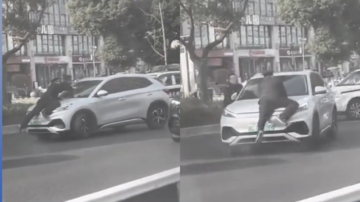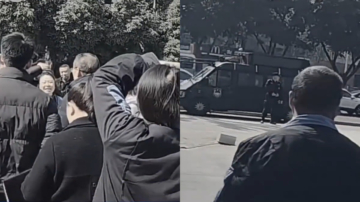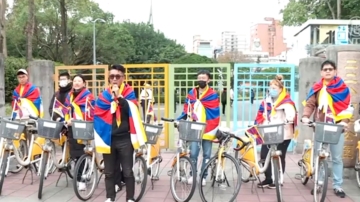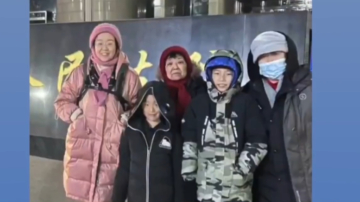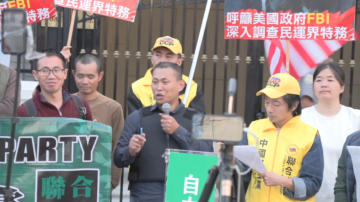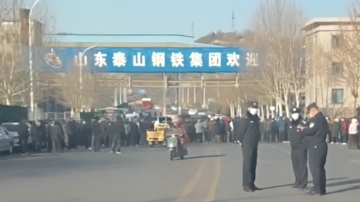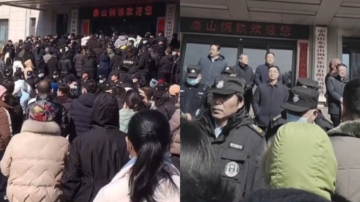【新唐人2013年08月01日讯】在中国大规模的城镇化过程中,很多农民丧失了赖以生存的土地,成为所谓的“城镇居民”。最近“中国社科院”出台一份报告,显示这些农民进城后,在各个方面都得不到公平待遇,从而引发各种冲突摩擦,造成社会矛盾加剧。下面请看报导。
7月30号,中国社科院“城市发展与环境研究所”和“社会科学文献出版社”联合发布了2013《城市蓝皮书》。蓝皮书指出,中国真实的完全城镇化率只有42.2%,比国家统计局公布的常住人口城镇化率低10.4个百分点。
蓝皮书揭示,农民失去土地进城之后,在政治权利、社会保障、公共服务、就业及教育等方面,都得不到公平待遇。再加上他们进城后,可能影响原住居民的既得利益,相互之间产生排斥,使社会矛盾加剧。
中国原《百姓》杂志主编黄良天:“它倒不是农民要进城,而是因为他们失去了家园、还有他们赖以生存的土地。他不能够自己拥有。”
多年来,中共各级政府热衷于大搞基建、房地产,从中捞取大量钱财,这也就是所谓的“土地财政”。在利益驱使下,当局经常出动军警、黑社会人员对不同意拆迁的民众进行强力打压,很多无辜民众被打伤、致残、致死,激起巨大民怨。上访无门的农民在这种残酷的“圈地运动”中无奈的失去土地,被迫成为所谓的“城镇居民”。
《城市蓝皮书》显示,当前中国城镇中,农业转移人口高达2.4亿人,占到城镇人口总数的1/3左右。
黄良天:“但是进城以后,他们(农民)又享受不到这种作为一个公民应该具有的这种社会福利,对农民没有。所以在这种情况下,那只好到市政府去游行了,去静坐了。 ”
云南玉溪的一位农民向《新唐人》吐露心声说,土地是农民最基本的生活资料。一旦离开土地并入城镇之后,农民将面临极大的生存压力。
云南玉溪农民 陈伟:“它是会把房价不断的提高,然后农民增加了本不应该承担的额外资本。农民真的很难。”
7月17号到24号,一周之内,北京市接连发生多起与公共安全相关的凶案,凸显大陆民怨沸腾、各种恶性事件一触即发。
这其中包括,山东男子冀中星因遭暴力执法殴打致残,申诉无门,绝望之下,20号在北京首都机场引爆自制爆炸装置、成为人肉炸弹事件。
香港《东方日报》评论认为,恶性案件不断发生,主要是因为社会矛盾长时间无法化解,很多上访者只能用暴力手段来吸引官方注意。面对排山倒海般的民怨,当局不是去疏导,反而处处围堵,期望通过高压“维稳”手段,将民众的抗议封杀。当今中国就像一口油井,只要一点火星,就会引发大爆炸。
北京宪政学者 陈永苗:“这种暴力案件,并不是人性本身的问题,而是政治问题。政治制度上的问题会带来人心的扭曲,然后通过犯罪或者互相仇杀来发泄。”
7月25号,公安部要求严惩个人极端暴力犯罪事件。 28号,北京市公安局长傅政华宣称,要以“盯苗头、压反弹、整秩序、保稳定”为重点,对当局认为的“严重刑事犯罪”要露头就打。
《东方日报》评论指出,中共当局将弱势群体当作目标的“维稳”思维,已走到穷途末路。自古以来没有哪一个政权能靠暴力维持长久。如不疏理民怨,中国大大小小的“怨塞湖”迟早有决堤的一天,届时将无人可以阻挡。
采访/陈汉 编辑/李谦 后制/葛雷
China's Doomsday Book: Forced Urbanization of Farmers
During China's massive urbanization process,
millions of farmers were driven off their farmland,
forcing them into ‘urban ghettos’.
Recently, Chinese Academy of Social
Sciences (CASS) released a report.
It shows that farmers have suffered from injustice
and inequality after being herded into the city.
This has triggered intense conflicts, thus creating
a social time-bomb, primed to ignite at any moment.
On July 30th, CASS issued 2013 Blue Book of Cities in China.
The Blue Book noted that China's real urbanization rate is only
42.2%. It is 10.4% points lower than national statistics' report.
The Blue Book revealed that since farmers were
driven off their land and forced into the city,
they have endured all kinds of hardships and discrimination:
in political, social security, public services, employment, education, housing…
In addition, they face loss of native residency rights
and interests. Thus social conflicts have intensified.
Huang Liangtian, People magazine Editor-in-Chief:
"It is not that farmers want to move into the city,
because they lost their farmland that they rely on,
they no longer have a home."
Over the years, the Chinese Communist Party (CCP)
vigorously invested in infrastructure and real estate, so as to gain great profits.
They call this,‘land finance’. Driven by self interests and greed,
the authorities regularly send police, and thugs to beat and
oppress people who are against the demolitions.
Many innocent people were injured, disabled,
and beaten to death, this arouses great public's anger.
Farmer with nowhere to go from their seized lands,
they out of necessity became ‘urban refugees’.
The Blue Book states that currently, 240 million farmers were
forced to the cities, making up 33% of the urban population.
Huang Liangtian: "After being coerced into the cities,
farmers Could not obtain social welfare.
Thus, in vain they appeal and ‘sit-in’ protest to
the government."
A Yunnan farmer told NTD that
farmland is the most basic living resource for them.
Once losing it and moving to the city,
they face the daily specter of their very survival.
Chen Wei, a farmer in Yuxi, Yunnan:
"House prices are constantly increasing.
It is an extra cost for farmers that we shouldn't bear.
Farmers are finding it really difficult to live."
From July 17th to 24th, within a week,
several killing incidents occurred in Beijing.
It highlights the public's anger, serious incidents can
take place at any minute. The fabric of society is crumbling.
A man in Shandong was brutally beaten by police,
rendering him disabled. He has nowhere to appeal.
In despair, on July 20th, he strapped a home-made bomb
to himself in Beijing Capital Airport. It becomes a suicide bombing incident.
Hong Kong's Oriental Daily commented that
malignant incidents constantly occur,
because the social conflicts haven't been resolved for so long.
Many petitioners are forced to resort to violent ends
to gain the attention of those in power.
In the face overwhelming public discontent,
the authorities not only failed to ease the malaise,
but also use extreme violent suppression against the protests.
Today's China is like an oil well,
just a little spark will ignite a huge explosion.
Chen Yongmiao, Beijing constitutional scholar:
"These kind of incidents are not a human nature problem,
but a political issue.
Problems in the political system will cause warped
thinking. People vent their anger via crime or killing."
On July 25th , Public Security Ministry ordered stern
punishment for individual crimes.
On July 28th , Fu Zhenghua, the director of Beijing Public
Security Bureau issued brutal suppression methods.
He ordered a complete crackdown at the first sign of protest.
Oriental Daily said that the CCP regime targets
the vulnerable groups to maintain the ‘stability’.
It indicates the CCP has come to a dead end now.
According to history, no one can rely on
violence to maintain power for too long.
Without dealing with public anger, one day,
it will be like a burst river, no one can stop it.
7月30号,中国社科院“城市发展与环境研究所”和“社会科学文献出版社”联合发布了2013《城市蓝皮书》。蓝皮书指出,中国真实的完全城镇化率只有42.2%,比国家统计局公布的常住人口城镇化率低10.4个百分点。
蓝皮书揭示,农民失去土地进城之后,在政治权利、社会保障、公共服务、就业及教育等方面,都得不到公平待遇。再加上他们进城后,可能影响原住居民的既得利益,相互之间产生排斥,使社会矛盾加剧。
中国原《百姓》杂志主编黄良天:“它倒不是农民要进城,而是因为他们失去了家园、还有他们赖以生存的土地。他不能够自己拥有。”
多年来,中共各级政府热衷于大搞基建、房地产,从中捞取大量钱财,这也就是所谓的“土地财政”。在利益驱使下,当局经常出动军警、黑社会人员对不同意拆迁的民众进行强力打压,很多无辜民众被打伤、致残、致死,激起巨大民怨。上访无门的农民在这种残酷的“圈地运动”中无奈的失去土地,被迫成为所谓的“城镇居民”。
《城市蓝皮书》显示,当前中国城镇中,农业转移人口高达2.4亿人,占到城镇人口总数的1/3左右。
黄良天:“但是进城以后,他们(农民)又享受不到这种作为一个公民应该具有的这种社会福利,对农民没有。所以在这种情况下,那只好到市政府去游行了,去静坐了。 ”
云南玉溪的一位农民向《新唐人》吐露心声说,土地是农民最基本的生活资料。一旦离开土地并入城镇之后,农民将面临极大的生存压力。
云南玉溪农民 陈伟:“它是会把房价不断的提高,然后农民增加了本不应该承担的额外资本。农民真的很难。”
7月17号到24号,一周之内,北京市接连发生多起与公共安全相关的凶案,凸显大陆民怨沸腾、各种恶性事件一触即发。
这其中包括,山东男子冀中星因遭暴力执法殴打致残,申诉无门,绝望之下,20号在北京首都机场引爆自制爆炸装置、成为人肉炸弹事件。
香港《东方日报》评论认为,恶性案件不断发生,主要是因为社会矛盾长时间无法化解,很多上访者只能用暴力手段来吸引官方注意。面对排山倒海般的民怨,当局不是去疏导,反而处处围堵,期望通过高压“维稳”手段,将民众的抗议封杀。当今中国就像一口油井,只要一点火星,就会引发大爆炸。
北京宪政学者 陈永苗:“这种暴力案件,并不是人性本身的问题,而是政治问题。政治制度上的问题会带来人心的扭曲,然后通过犯罪或者互相仇杀来发泄。”
7月25号,公安部要求严惩个人极端暴力犯罪事件。 28号,北京市公安局长傅政华宣称,要以“盯苗头、压反弹、整秩序、保稳定”为重点,对当局认为的“严重刑事犯罪”要露头就打。
《东方日报》评论指出,中共当局将弱势群体当作目标的“维稳”思维,已走到穷途末路。自古以来没有哪一个政权能靠暴力维持长久。如不疏理民怨,中国大大小小的“怨塞湖”迟早有决堤的一天,届时将无人可以阻挡。
采访/陈汉 编辑/李谦 后制/葛雷
China's Doomsday Book: Forced Urbanization of Farmers
During China's massive urbanization process,
millions of farmers were driven off their farmland,
forcing them into ‘urban ghettos’.
Recently, Chinese Academy of Social
Sciences (CASS) released a report.
It shows that farmers have suffered from injustice
and inequality after being herded into the city.
This has triggered intense conflicts, thus creating
a social time-bomb, primed to ignite at any moment.
On July 30th, CASS issued 2013 Blue Book of Cities in China.
The Blue Book noted that China's real urbanization rate is only
42.2%. It is 10.4% points lower than national statistics' report.
The Blue Book revealed that since farmers were
driven off their land and forced into the city,
they have endured all kinds of hardships and discrimination:
in political, social security, public services, employment, education, housing…
In addition, they face loss of native residency rights
and interests. Thus social conflicts have intensified.
Huang Liangtian, People magazine Editor-in-Chief:
"It is not that farmers want to move into the city,
because they lost their farmland that they rely on,
they no longer have a home."
Over the years, the Chinese Communist Party (CCP)
vigorously invested in infrastructure and real estate, so as to gain great profits.
They call this,‘land finance’. Driven by self interests and greed,
the authorities regularly send police, and thugs to beat and
oppress people who are against the demolitions.
Many innocent people were injured, disabled,
and beaten to death, this arouses great public's anger.
Farmer with nowhere to go from their seized lands,
they out of necessity became ‘urban refugees’.
The Blue Book states that currently, 240 million farmers were
forced to the cities, making up 33% of the urban population.
Huang Liangtian: "After being coerced into the cities,
farmers Could not obtain social welfare.
Thus, in vain they appeal and ‘sit-in’ protest to
the government."
A Yunnan farmer told NTD that
farmland is the most basic living resource for them.
Once losing it and moving to the city,
they face the daily specter of their very survival.
Chen Wei, a farmer in Yuxi, Yunnan:
"House prices are constantly increasing.
It is an extra cost for farmers that we shouldn't bear.
Farmers are finding it really difficult to live."
From July 17th to 24th, within a week,
several killing incidents occurred in Beijing.
It highlights the public's anger, serious incidents can
take place at any minute. The fabric of society is crumbling.
A man in Shandong was brutally beaten by police,
rendering him disabled. He has nowhere to appeal.
In despair, on July 20th, he strapped a home-made bomb
to himself in Beijing Capital Airport. It becomes a suicide bombing incident.
Hong Kong's Oriental Daily commented that
malignant incidents constantly occur,
because the social conflicts haven't been resolved for so long.
Many petitioners are forced to resort to violent ends
to gain the attention of those in power.
In the face overwhelming public discontent,
the authorities not only failed to ease the malaise,
but also use extreme violent suppression against the protests.
Today's China is like an oil well,
just a little spark will ignite a huge explosion.
Chen Yongmiao, Beijing constitutional scholar:
"These kind of incidents are not a human nature problem,
but a political issue.
Problems in the political system will cause warped
thinking. People vent their anger via crime or killing."
On July 25th , Public Security Ministry ordered stern
punishment for individual crimes.
On July 28th , Fu Zhenghua, the director of Beijing Public
Security Bureau issued brutal suppression methods.
He ordered a complete crackdown at the first sign of protest.
Oriental Daily said that the CCP regime targets
the vulnerable groups to maintain the ‘stability’.
It indicates the CCP has come to a dead end now.
According to history, no one can rely on
violence to maintain power for too long.
Without dealing with public anger, one day,
it will be like a burst river, no one can stop it.

